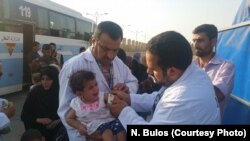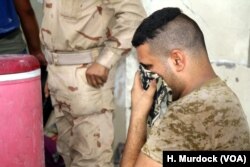“Sir, my father was an Islamic State militant, but he divorced my mother in 2013,” said Jassem Mohammad, 21, pulling out his identification card and presenting it to the camp manager. “He now has two other wives.”
In a tiny patch of shade on the edge of a blistering desert camp outside of Mosul, the manager listened as Mohammad made his case. He wanted to leave the camp and go back to college. He had good scores, he said, and was never involved with IS.
Militant rule in Mosul has collapsed and IS fighters here are dead, fled, arrested or in hiding. But as their relatives try to re-integrate into society, Iraqi authorities face impossible questions with only bad answers.
If someone loved or even tolerated an IS militant, is that person guilty? How do the relatives of the perpetrators make peace with the relatives of the victims?
Officially in Iraq, the answer to the first question is “no,” especially when speaking of small children. Women and children fleeing areas IS occupied are checked for bombs, and when cleared, they are considered civilians.
Unofficially, families of militants are shunned, feared and often separated from the “regular” people, all traumatized by violence and extreme poverty under IS. Many IS families now live in camps, like Mohammad, where they are not quite sure if they are being detained or protected. And both, in fact, are true.
“We’d need to see the divorce papers,” the camp manager explained to Mohammad. If Mohammad offered evidence that his father was not in his life during IS rule in Mosul, it might be possible for him to go back to school.
“I want to study and do humanitarian work,” Mohammad continued, pleading his case to a nearby journalist.
Appearances
As Mohammad and the reporter chatted, the camp manager looked nonplused and strolled away. A security officer, in contrast, was visibly annoyed and abruptly ended the conversation.
“You cannot talk to him without official permission,” he said, ushering all journalists out of the camp. Other Iraqi officers said they worry that news about camps set aside for IS families will make them look like monsters, locking up women and children.
“What can we do as the Iraqi government?” said a member of a community police force who didn’t want to be named because he was not authorized to speak to the media. “We are exposed to danger. They are families, but we can’t loose them without rehabilitation.”
Distrust on all sides
Inside the city, at the base of a long-dormant Ferris wheel, a short row of tents served as a collection point for families fleeing Mosul in the final days of battle.
Women and children filed into the tents, some collapsing where they sat. Medics treated injuries and food and water alleviated some of the most pressing pains. Many of the people had been hiding in basements for weeks, after months of water shortages. The smell of unwashed bodies was pungent and the heat in the stagnant tents was overwhelming.
“We were imprisoned,” said Khalifa, 46, a mother of three. Unlike the rest of the women in the tent, she wore no veil and her curly hair was tousled. “We tried to run away and militants locked us in a basement. For the past three days we’ve had no food or water.”
“Once they brought us food in the basement,” adds Hoda, 25, her daughter. “He came down wearing a suicide vest.”
Their story echoed tales from families all over Mosul and, even if their husbands or fathers were IS fighters, it could still be true. However, local authorities worried they were lying, casting themselves as victims, rather than somehow complicit.
One man peppered Hoda with questions about the neighborhood she said she was from. IS militants in Mosul were often not stationed near their original homes. Hoda failed to identify the most famous church, mosque and graveyard in the area.
“See, they are an IS family,” the man said. “They are lying.”
Another woman, Fatima, a mother of eight, said for relatives of IS omitting certain truths is a matter of survival. Sitting with an intelligence official, Fatima admitted she had two brothers that fought with IS. Both, she said, are now dead and she never supported their decision to join IS.
But when the officer walked away, she said at least one of her brothers is alive and now in Tal Afar, an Iraqi city still held by IS.
“We are afraid to tell them when we talk to family members who are with IS,” she whispered. “We don’t want to be blamed for what they did.”







